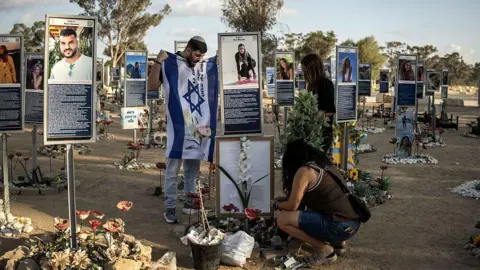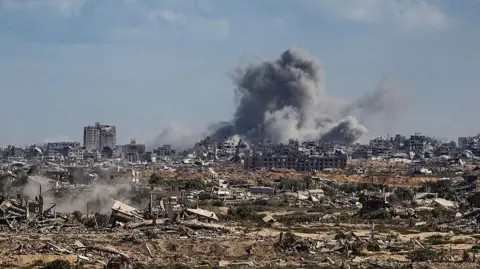Tom BennettJerusalem,
Alice CuddyTel Aviv,
Yolande KnellRe’im and
Rushdi AbualoufGaza correspondent
 AFP via Getty Images
AFP via Getty ImagesIsraelis have gathered across the country to mark two years since the Hamas-led attack on 7 October 2023, as negotiations continued in Egypt over an end to the war in Gaza.
The attack saw over 1,200 people killed and 251 others taken back to Gaza as hostages. It was the single deadliest day for Jews since the Holocaust.
Israel responded by launching a military offensive in Gaza which has killed more than 67,000 people, according to the territory’s Hamas-run health ministry. Its figures are seen as reliable by the UN and other international bodies.
Prime Minister Benjamin Netanyahu said in a statement that alongside “immense pain”, Israel had shown “miraculous resilience”.
“Our bloodthirsty enemies have hit us hard, but they have not broken us,” Netanyahu said on Tuesday.
He vowed to “achieve all the goals of the war: the return of all the kidnapped, the elimination of the Hamas regime and the promise that Gaza will no longer pose a threat to Israel”.
Recalling Hamas’s attack on southern Israel two years ago, UN Secretary General António Guterres said: “The horror of that dark day will be forever seared in the memories of us all”.
He also called on all parties to agree to US President Donald Trump’s peace plan, describing it as a “historic opportunity” to “bring this tragic conflict to an end”.
The Israeli government delayed official memorials until 16 October – after the end of the Jewish High Holiday season – but events still took place across the country on Tuesday.
A memorial ceremony for the families of Israelis killed in the Hamas attack was held in Tel Aviv. Organised by the families themselves, it was broadcast across Israeli television channels.
Hours earlier, a minute’s silence was observed across the country.
Meanwhile, Israeli and Hamas negotiating teams convened in the Egyptian Red Sea resort of Sharm el-Sheikh for a second day of indirect talks to discuss the terms of the proposal.
A senior Palestinian official familiar with the negotiations told the BBC that an evening round of indirect talks began at 19:00 Cairo time (17:00 GMT).
The official said the morning session ended without tangible results, amid disagreements over the proposed Israeli withdrawal maps from Gaza and over guarantees Hamas wants to ensure Israel does not resume fighting after the first phase of the deal.
He added that the talks are “tough and have yet to produce any real breakthrough,” but noted that mediators are working hard to narrow the gaps between the two sides.
Earlier, a Palestinian official said the negotiations were focused on five key issues: a permanent ceasefire; the exchange of the hostages still held by Hamas for Palestinian prisoners and detainees from Gaza; the withdrawal of Israeli forces from Gaza; arrangements for humanitarian aid deliveries; and post-war governance of the territory.
President Trump’s negotiators, Steve Witkoff and Jared Kushner, were expected to depart the US this evening and arrive in Egypt on Wednesday, a source familiar with the talks told the BBC.
“We have a really good chance of making a deal, and it’ll be a lasting deal,” the president told reporters at the White House on Monday.
In Tel Aviv’s Hostages Square earlier, 29-year-old Hagar – whose brother survived the attack on the Nova music festival, where 378 people were killed and dozens more were taken hostage by Hamas gunmen – told the BBC: “No place feels like home anymore and until all the hostages come back none of us will feel safe.”
“When we see everybody home again, we can breathe again. Then we can start to recover,” she added.
Outside Israeli Prime Minister Benjamin Netanyahu’s residence in Jerusalem, people gathered to show their support for the families of the hostages. Israel says 48 remain in captivity in Gaza, 20 of whom are believed to be alive.
Demonstrator Atalia Regev told the BBC: “We need to do every compromise needed for the hostages to come back home. But we really want assurances that we will be safe.”
Opinion polls now consistently show that around 70% of Israelis want the war to end in exchange for the release of the hostages.
At the site of Nova festival, mourners gathered to pay their respects.
From there, the boom of Israelis air strikes and artillery could be heard just a few kilometres away in Gaza, where witnesses said the intense Israeli bombardment continued.
In Gaza City, air and artillery strikes were reported in the early hours of Tuesday in the western Tal al-Hawa, Rimal and Nasr neighbourhoods and in the eastern neighbourhood of Sheikh Radwan, as well Shati refugee camp to the north-west.
“When the evening comes, the fear comes with it,” displaced Gaza City resident Emaan al-Wahidi, whose 17-year-old son was killed by an Israeli air strike last year, told the BBC.
“Me and my three children are afraid of the air strikes. All the night we are sleeping together, holding each other, especially my smallest child who puts his head on me all night.”
“Every second we look at the news to see what happened. And I’m afraid that this ceasefire will not be completed and that the war will come back to us.”
 Anadolu via Getty Images
Anadolu via Getty ImagesAl-Shifa hospital in Gaza City said it had received the bodies of six people by the afternoon, including three killed in an Israeli strike in the southern al-Sabra neighbourhood.
Nasser hospital in the southern city of Khan Younis said another two dead people had been brought there. One of them was killed by Israeli forces while seeking aid to the south, medics said.
Unicef spokesman James Elder described how mothers and wounded children were “lining the corridor floors” of Nasser, and that premature babies were having to share a single bed or oxygen source.
“In one of the paediatric rooms, there were three babies and three mums on a single bed, one source of oxygen, and the mothers would rotate the oxygen 20 minutes to each child,” he told Reuters news agency. “This is the level of desperation mums have now got to.”
Gaza’s health ministry said 25 of the territory’s 38 hospitals were now out of service, and that the remaining 13 were only operating partially.
Meanwhile, the Israeli military said that a rocket was launched from northern Gaza into Israel on Tuesday morning, triggering sirens in Netiv HaAsara. The projectile fell in the area and that no injuries or damage were reported, it added.
International journalists have been banned by Israel from entering the Gaza Strip independently since the start of the war, making verifying claims from both sides difficult.




